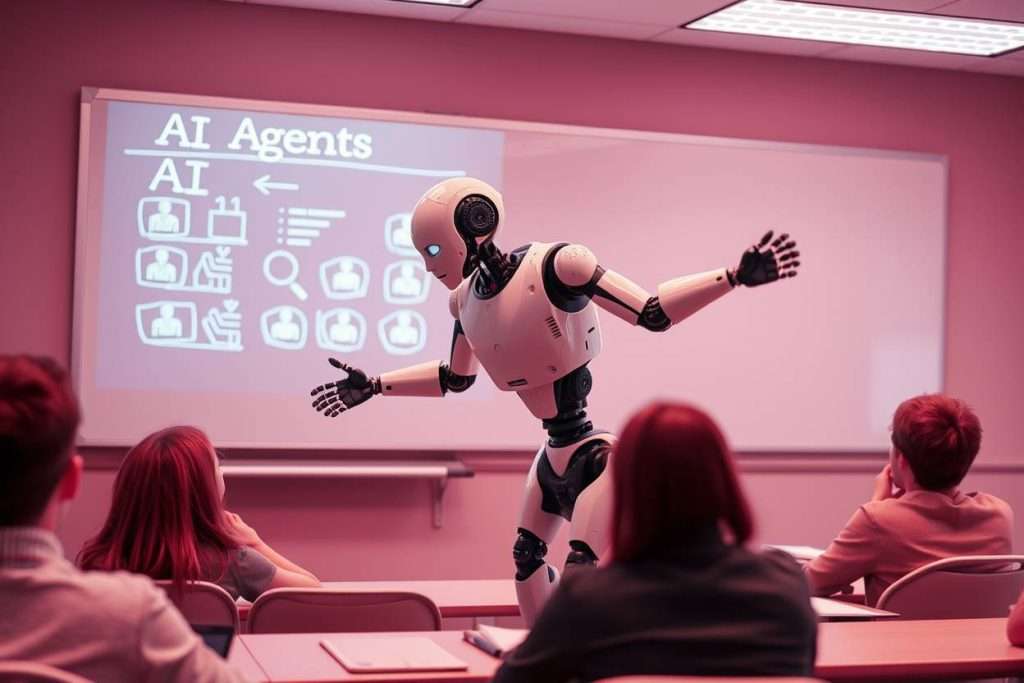Agentic AI definition: A Guide for Non-Technical Users

Agentic AI definition: Agentic AI (or AI agents) is a type of artificial intelligence that can work independently to reach set goals with minimal human supervision, similar to having a personal assistant who can think and act on their own, for you.
Artificial intelligence isn’t coming to your life—it’s already here. 77% of the devices you use daily contain some form of AI, yet only one-third of people realize they’re actually using AI platforms. From the moment your phone’s alarm adapts to your sleep patterns to when Netflix suggests your next binge-watch, AI agents are quietly working behind the scenes.
The numbers tell a remarkable story of rapid adoption. ChatGPT reached 1 million users in just 5 days—faster than any platform in history. The global AI market has exploded to $391 billion, with projections reaching $1.8 trillion by 2030. And here is the good news: AI is not just for the tech experts, but rather everybody can use it, regardless of your technical skills.
But what exactly makes AI “agentic,” and why should you care? The answer lies in understanding how these systems went from simple tools that follow commands to smart assistants that understand tasks, decide, take action and adapt to your needs, often better than you might expect.
Agentic AI definition: what are AI Agents?
Agentic AI refers to artificial intelligence systems that act like independent helpers. These AI agents understand goals, make decisions, and complete tasks without requiring detailed instructions for every step. Unlike traditional computer programs that follow rigid rules, agentic AI systems adapt to new situations and work toward objectives much like a capable assistant would.
How is an AI Agent Different from Regular Computer Programs?
Traditional computer programs follow predetermined instructions. A calculator app performs exactly the same steps every time you add two numbers. Agentic AI operate differently—they analyze situations, consider options, and choose the best course of action.
Regular software requires programmers to anticipate every possible scenario. Agentic AI learn from experience and handle unexpected situations. When your email spam filter correctly identifies a new type of unwanted message it has never seen before, it demonstrates agentic behavior.
What Makes an AI “Agentic” – and Why Should You Care?
Agentic AI possess three essential capabilities that distinguish them from basic software. They understand objectives and work toward specific goals. They perceive their environment and gather relevant information. They remember previous interactions and apply lessons learned to new situations.
These capabilities matter because they enable AI systems to provide more helpful, personalized assistance. Instead of requiring you to learn complex commands or navigate confusing menus, agentic AI adapts to your communication style and preferences.
Why is Everyone Talking About AI Agents Now?
Recent technological breakthroughs have made AI agents more capable and accessible. Advanced language models can now understand context, maintain conversations, and perform complex reasoning tasks. Computing power has increased dramatically while costs have decreased, making sophisticated AI available to everyday users.
The shift from narrow AI systems that perform single tasks to more general-purpose agents represents a fundamental change in how we interact with technology.
How Do AI Agents Help in Everyday Life
| Category | Statistic | Key Insights |
|---|---|---|
| Everyday Usage | 77% of devices being used have some form of AI | Most people are already using AI daily without realizing it |
| Awareness Gap | Only 1/3 of consumers think they’re using AI, while actual usage is 77% | There’s a significant gap between perceived and actual AI usage |
| Virtual Assistants | Across all age groups, virtual assistants like Siri and Alexa are the most commonly used AI technology | Personal AI assistants have become mainstream across generations |
| Demographic Usage | 30.8% of people 61+ use virtual assistants weekly | Even older generations are adopting AI assistants regularly |
| Voice Assistant Accuracy | Google Assistant has 98% accuracy in navigation tasks | Voice assistants are becoming increasingly reliable for everyday tasks |
| Assistant Capabilities | Google Assistant outperforms Siri and Alexa in local (93%), commerce (92%), and information (96%) queries | Different assistants have varying strengths for different tasks |
| Trust Issues | Only 7% of people trust chatbots when making claims vs. 49% for human advisors | Trust remains a significant barrier for AI adoption |
| Common Uses | Top consumer uses: responding to texts/emails (45%), answering financial questions (43%), planning travel (38%) | AI is most useful for routine tasks requiring information processing |
| User Confidence | 88% of non-users are unclear how generative AI will impact their lives | Many people don’t understand AI’s potential benefits |
| Generational Divide | 68% of non-users are Gen X or Baby Boomers | Older generations are adopting AI more slowly than younger ones |
| User Optimism | 50% of consumers view AI optimistically | Half of consumers see potential benefits in AI technology |
| Customer Experience | 54% of consumers think AI could improve customer experiences | Many see AI as potentially enhancing service quality |
| Content Quality | 54% of consumers believe written content will improve with AI technology | Users expect AI to enhance rather than degrade content quality |
What Can AI Agents Do That Your Phone or Computer Can’t?

AI agents excel at handling multi-step processes without requiring constant guidance. They maintain context throughout lengthy interactions, remember your preferences, and adjust their approach based on feedback.
Traditional software requires users to navigate through menus, fill out forms, and specify exact parameters. AI agents understand natural language requests and figure out the necessary steps independently.
What Popular Tools Are Actually AI Agents in Disguise?
Many familiar services already use agentic AI technology. Smart home assistants like Amazon Alexa and Google Home understand voice commands, control connected devices, and learn your daily routines. They anticipate your needs and proactively suggest actions.
Online shopping platforms use AI agents to analyze your browsing history, compare your preferences with similar customers, and recommend products you might enjoy. These systems continuously refine their suggestions based on your responses and purchases.
Streaming services employ AI agents to curate personalized content recommendations. Netflix’s recommendation engine processes viewing patterns, analyzes content preferences, and suggests movies and shows tailored to individual taste.
How Are AI Agents Making Work Easier?
Customer service departments increasingly rely on AI agents to handle routine inquiries, troubleshoot common problems, and escalate complex issues to human representatives. These systems resolve customer concerns faster while reducing wait times.
Research assistants powered by AI agents can scan thousands of documents, extract relevant information, and summarize findings in digestible formats. They save professionals hours of manual research time.
Email and calendar management systems use AI agents to prioritize messages, schedule meetings, and suggest optimal times for important tasks based on your productivity patterns and commitments.
How Smart Are Today’s AI Agents Really?
What Can AI Agents Figure Out on Their Own?
Modern AI agents demonstrate impressive problem-solving abilities. They break complex requests into manageable steps, identify required resources, and execute multi-part plans. They adapt strategies when initial approaches don’t work and find alternative solutions.
AI agents excel at pattern recognition, connecting seemingly unrelated information to generate insights. They process vast amounts of data quickly and identify trends that humans might miss.
What Do AI Agents Still Get Wrong?
AI agents sometimes generate plausible-sounding but incorrect information, a phenomenon known as “hallucination.” They may confidently present false facts or create fictional details when they lack sufficient knowledge about a topic.
These systems struggle with completely novel situations that differ significantly from their training data. They may apply inappropriate solutions or fail to recognize when they lack the necessary expertise to help.
Are AI Agents Actually Thinking Like People?
AI agents create convincing impressions of understanding through sophisticated pattern matching and statistical analysis. However, they don’t possess consciousness, emotions, or genuine comprehension in the human sense.
Their responses result from processing patterns in training data rather than true understanding. This distinction matters when evaluating their suggestions and determining when human judgment remains essential.
Common Myths About AI Agents
“Can AI Agents Take Over My Job?”
AI agents excel at automating routine tasks, analyzing data, and handling repetitive processes. They struggle with creative problem-solving, emotional intelligence, and complex decision-making that requires human judgment.
Most jobs will likely be augmented rather than replaced by AI agents. Workers who learn to collaborate effectively with AI tools often become more productive and valuable in their roles.
“Are AI Agents Dangerous or Harmful?”
Well-designed AI agents operate within carefully defined boundaries and include safety mechanisms to prevent harmful actions. The primary risks involve over-reliance on AI suggestions without verification and potential privacy concerns related to data collection.
Responsible AI development emphasizes transparency, human oversight, and ethical considerations. Users maintain control over AI agents through clear instructions and monitoring of their actions.
“Do AI Agents Understand Me Like a Person Would?”
AI agents process language patterns and respond appropriately to many requests, but they don’t possess emotional understanding or empathy. They simulate helpfulness through programmed responses rather than genuine care or concern.
This limitation affects their ability to handle sensitive situations, provide emotional support, or make nuanced judgments that require human wisdom and experience.
Getting Started with AI Agents
How Do You Talk to AI Agents to Get the Best Results?
Clear, specific instructions produce better results than vague requests. Provide context about your goals, preferences, and constraints. Break complex requests into smaller, manageable parts.
Give feedback about AI responses to help agents learn your communication style and preferences. Specify when suggestions are helpful or miss the mark to improve future interactions.
What Should You Look For in an AI Helper?
Prioritize user-friendly interfaces that don’t require technical expertise. Look for transparent privacy policies that explain how your data is collected and used. Choose systems that provide clear explanations for their recommendations and allow you to maintain control over decisions.
Consider AI agents that integrate well with tools and services you already use. Seamless integration reduces learning curves and increases practical value.
What Skills Help You Work Better with AI Agents?
Develop critical thinking skills to evaluate AI suggestions objectively. Learn to verify important information through multiple sources rather than accepting AI responses at face value.
Practice articulating your needs clearly and providing constructive feedback. Understanding AI capabilities and limitations helps you set appropriate expectations and use these tools effectively.
The Future of AI Agents in Your Life
How Will AI Agents Change in the Next Few Years?
AI agents will become more specialized and capable of handling complex, multi-step tasks with minimal supervision. They will develop better understanding of context and user intent, leading to more natural and productive interactions.
Collaboration between multiple AI agents will enable them to tackle larger projects by dividing work and sharing information. This cooperative approach will expand the scope of problems AI can help solve.
How Might AI Agents Change How We Live and Work?
Personal AI assistants will manage more aspects of daily life, from handling routine communications to optimizing schedules and making recommendations for health, finance, and entertainment decisions.
Educational AI agents will provide personalized tutoring, adapt to individual learning styles, and offer immediate feedback on progress. They will make high-quality education more accessible and affordable worldwide.
Healthcare AI agents will monitor vital signs, remind patients about medications, and flag potential health concerns for professional review. They will support preventive care and early intervention strategies.
What Should Everyone Know About Living with AI Agents?
Maintaining human judgment and oversight remains crucial as AI agents become more sophisticated. Use these tools to enhance your capabilities rather than replace your decision-making responsibilities.
Stay informed about AI developments and privacy considerations. Participate in discussions about ethical AI use and support policies that promote responsible development and deployment of AI technologies.
Understanding AI agents today prepares you for a future where these intelligent assistants become increasingly integrated into work, education, and daily life. The key to success lies in learning to collaborate effectively with AI while maintaining critical thinking and human judgment.
Frequently Asked Questions
1. What exactly is an AI agent in simple terms?
An AI agent is like a digital assistant that can understand what you want to accomplish and work independently to help you achieve it. Unlike regular apps that only follow specific commands, AI agents can figure out the steps needed to complete a task, adapt when things change, and learn from experience—similar to how a helpful human assistant would work.
2. How is an AI agent different from apps I already use?
Regular apps need you to press specific buttons or give exact commands for every step. AI agents can understand your overall goal (like “plan my weekend trip”) and handle multiple steps on their own. Think of it like the difference between having to micromanage someone versus being able to delegate a task to a competent assistant.
3. What can AI personal assistants like Alexa and Siri actually do for me?
Today’s AI assistants can handle tasks like setting reminders, answering questions, controlling smart home devices, making calls or sending texts, playing music, providing weather updates, and even helping with online shopping. The more advanced ones can also have natural conversations, remember your preferences, and suggest things based on your habits.
4. Do I need technical skills to use AI agents effectively?
Not at all! Modern AI agents are designed to understand everyday language. You don’t need to learn special commands or technical terms—just speak or type naturally, like “remind me to call Mom tomorrow at 6 PM” or “find Italian restaurants near me with good reviews.” The AI figures out the rest.
5. How private are my conversations with AI assistants?
This varies by product, but most AI assistants do record and store your interactions to improve their service. Companies like Apple, Google, and Amazon have privacy settings that let you view, delete, or limit what data is saved. It’s worth checking these settings if privacy is important to you. Remember that devices with “wake words” (like “Hey Siri”) are always listening for those specific words.
6. Are AI agents actually smart or just following programming?
AI agents aren’t conscious or truly “smart” like humans, but they’re not just following simple programming either. They use complex pattern recognition from millions of examples to understand language, make predictions, and solve problems. Think of them as very sophisticated tools that can simulate some aspects of human thinking without actually being conscious.
7. Why does my AI assistant sometimes get things completely wrong?
AI assistants make mistakes because they don’t truly understand the world—they make predictions based on patterns in data. They can be confused by unusual phrasings, ambiguous requests, or situations they haven’t encountered before. They also lack common sense and can’t verify information the way humans do. This is why human oversight is still important.
8. Will AI agents replace my job or make me obsolete?
While AI is changing the job market, it’s more likely to transform jobs than eliminate them entirely. AI tends to automate specific tasks rather than whole jobs. The statistics show that while AI might eliminate 85 million jobs by 2025, it’s expected to create 97 million new ones—resulting in a net gain of 12 million jobs. These new roles often involve working alongside AI rather than being replaced by it.
9. How can I get started with using AI agents if I’m not tech-savvy?
Start small with voice assistants on your phone or smart speakers, which are designed to be user-friendly. Try basic commands like asking for weather forecasts, setting timers, or playing music. As you get comfortable, gradually try more complex requests. Remember that using natural language works best—you don’t need special “computer language” to communicate with modern AI assistants.
10. How can I tell if information from an AI agent is trustworthy?
Always verify important information from multiple sources, especially for health, financial, or critical decisions. AI can sometimes present incorrect information confidently or create “hallucinations” (made-up facts). For important matters, use AI as a starting point but cross-check with reliable sources. This is why only 7% of people trust chatbots when making claims, compared to 49% who trust human advisors.




